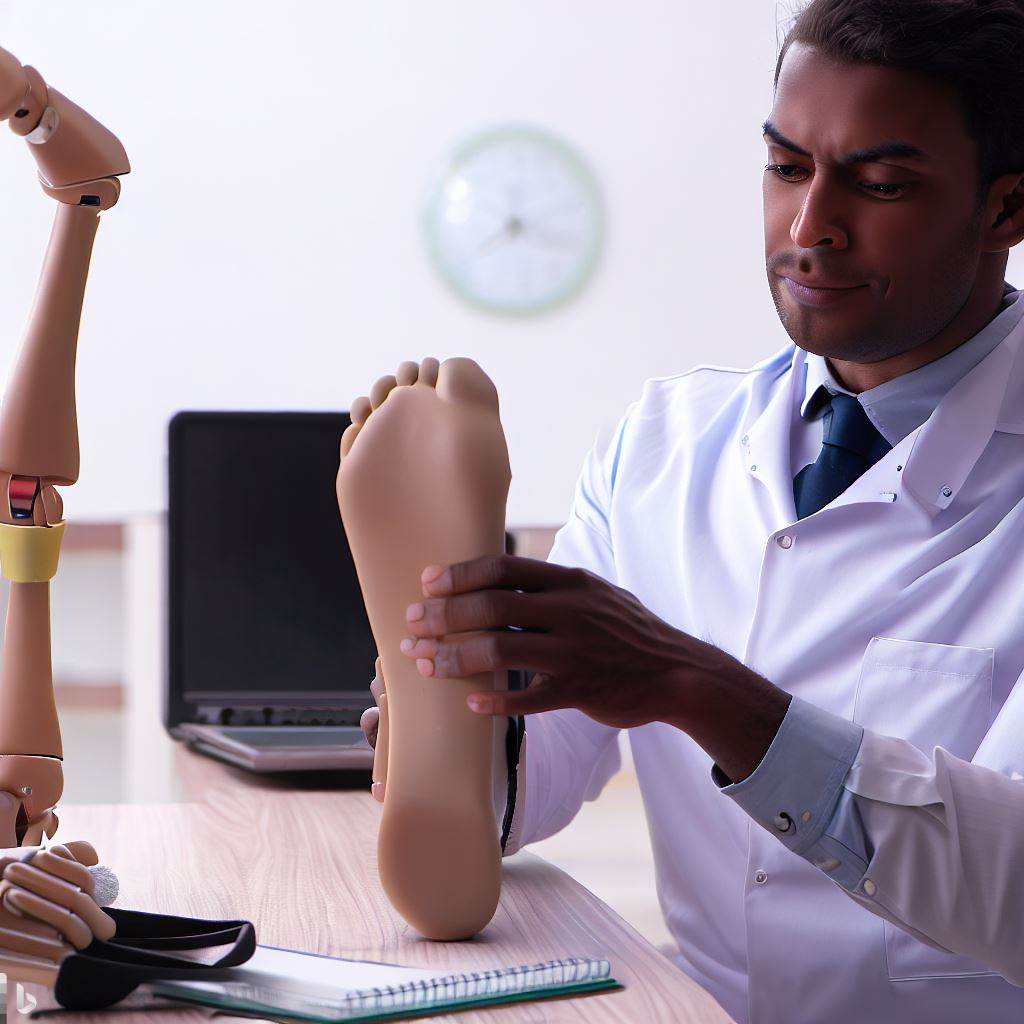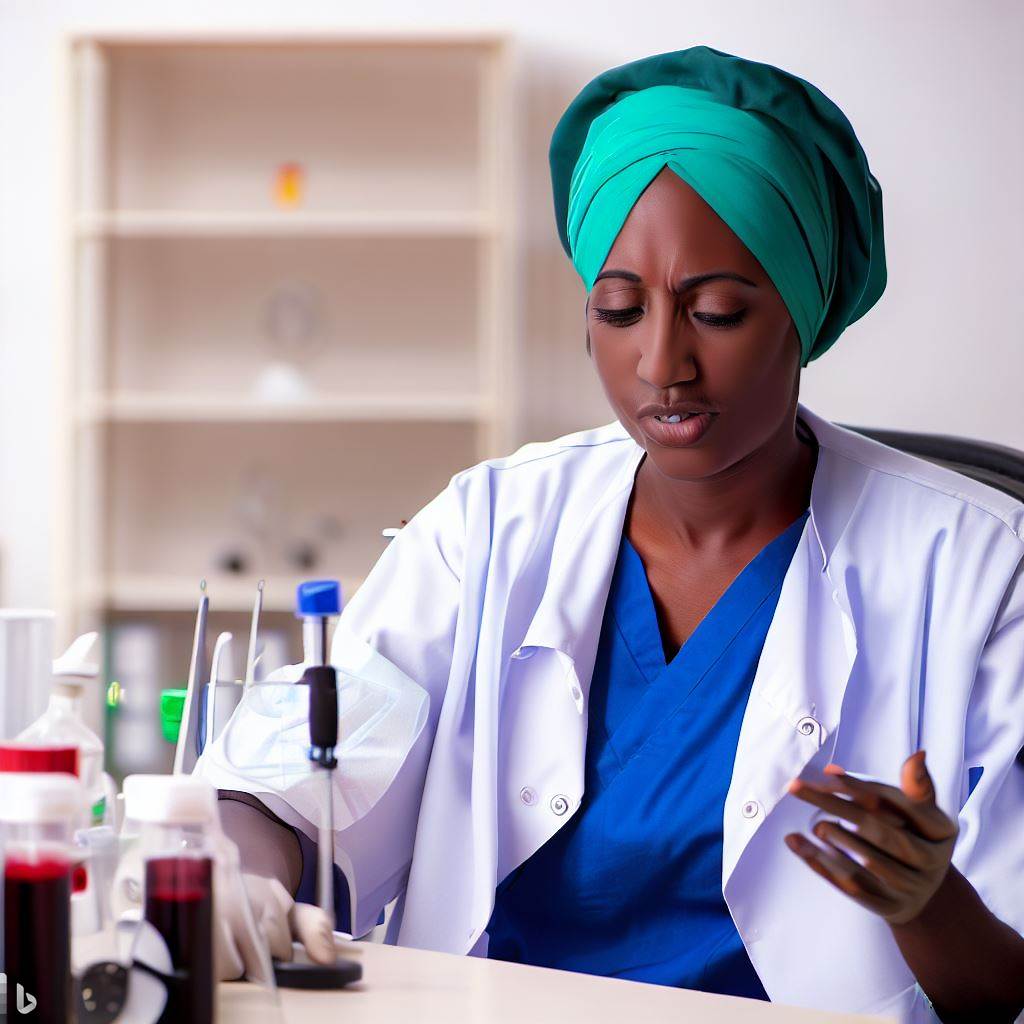Introduction
Economic factors have a significant impact on the practice of orthotics and prosthetics (O P) in Nigeria.
Limited funding, high unemployment rates, and economic instability can all contribute to challenges in the O&P community.
For example, limited funding can make it difficult to procure essential equipment, materials, and hire qualified professionals.
This can compromise the quality and accessibility of O&P care.
Additionally, high unemployment rates and low income levels make it difficult for individuals to afford prosthetic limbs, orthotic supports, and other necessary devices.
This financial barrier often prevents patients from accessing the care they need.
Economic instability can also lead to a brain drain of skilled O&P professionals.
In search of better economic opportunities, talented practitioners may leave Nigeria, further exacerbating the shortage of qualified professionals in the field.
Recognizing and addressing these economic factors is crucial for improving the quality and accessibility of O&P services in Nigeria.
Understanding O&P Practice in Nigeria
Provide an overview of Orthotics and Prosthetics (O&P) practice
Orthotics and Prosthetics (O&P) practice involves designing and fitting medical devices to support, protect, or replace body parts.
These devices, known as orthoses and prostheses, help individuals with physical disabilities to regain mobility and function.
O&P practice combines technical skills, medical knowledge, and empathy to create customized solutions for patients.
Orthotists and prosthetists are the healthcare professionals who specialize in O&P practice.
Orthotists focus on designing and fitting orthoses, while prosthetists specialize in prostheses.
O&P practice aims to improve the quality of life for individuals with limb loss, amputation, or other disabilities.
Discuss the importance of O&P practice in Nigeria
O&P practice plays a crucial role in addressing the healthcare needs of the Nigerian population.
Nigeria has a high prevalence of disabilities resulting from factors such as accidents, conflicts, and diseases.
Orthoses and prostheses help individuals with disabilities to lead independent lives and participate in society.
O&P practice promotes inclusivity, social integration, and empowerment for people with physical impairments.
It enhances their ability to engage in work, education, sports, and other activities, contributing to economic growth.
Access to quality O&P services can significantly improve the overall well-being of individuals and their families.
Highlight the key stakeholders involved in O&P practice
Orthotists and prosthetists are the primary healthcare professionals involved in O&P practice.
They work closely with rehabilitation specialists, physicians, and nurses to provide comprehensive care.
Medical equipment suppliers play a vital role in the procurement and availability of orthoses and prostheses.
O&P practice also relies on support from policymakers, government agencies, and non-profit organizations.
Research institutions contribute to advancing O&P technology, improving outcomes, and driving innovation.
Additionally, the involvement of patients and their families is crucial for successful O&P practice.
In the end, Orthotics and Prosthetics (O&P) practice in Nigeria provides essential services to individuals with disabilities by designing and fitting orthoses and prostheses.
It enables them to regain mobility, independence, and improve their overall quality of life.
O&P practice is vital for inclusive and empowered communities.
The primary stakeholders involved include orthotists, prosthetists, rehabilitation specialists, healthcare professionals, equipment suppliers, policymakers, and patients themselves.
Collaborative efforts among these stakeholders are necessary to ensure the availability and accessibility of O&P services in Nigeria.
Read: The Role of Exercise Physiology in Nigeria’s Sports Industry
Economic Factors Influencing O&P Practice in Nigeria
Identify and explain the economic factors affecting O&P practice
Government policies and regulations
Government policies play a vital role in shaping the O&P practice landscape in Nigeria.
Policies that are supportive, such as the inclusion of O&P services in healthcare insurance schemes, can enhance access to services.
On the other hand, restrictive regulations can impede the growth and development of the profession.
Economic stability and inflation
Economic stability and inflation directly affect the affordability of O&P services.
In times of economic instability and high inflation, the cost of materials and equipment needed for O&P may increase, making them less accessible and affordable to individuals in need.
This can result in limited access to quality O&P care and hinder the practice’s growth.
Labor market dynamics
The availability and skill level of O&P professionals greatly influence the practice in Nigeria.
A shortage of skilled practitioners can create a bottleneck in service delivery, leading to long waiting times for patients.
Additionally, if there is a mismatch between the demand for O&P services and the supply of professionals, the quality of patient care may be compromised.
Financial constraints and funding availability
Adequate financial resources are essential for the provision of quality O&P services.
Financial constraints, both at the individual and institutional levels, can limit the ability to invest in necessary equipment, training, and research.
Limited funding availability also hampers the expansion of O&P facilities, hindering their ability to cater to the needs of a larger population.
In general, the economic factors mentioned above have a significant impact on the O&P practice in Nigeria.
Government policies and regulations, economic stability, labor market dynamics, and financial constraints all shape the availability, accessibility, and affordability of O&P services.
To ensure the growth and development of O&P practice in Nigeria, it is imperative to address these economic factors and create an enabling environment for the profession.
Impact of Economic Factors on O P Practice in Nigeria
In Nigeria, various economic factors significantly influence the Orthotics and Prosthetics (O&P) practice.
Firstly, government policies and regulations play a crucial role in shaping the O&P sector.
Favorable policies can lead to increased investments and advancements in technology, while excessive bureaucracy might hinder growth.
Secondly, economic stability and inflation profoundly affect O&P practice.
A stable economy fosters higher demand for healthcare services, including orthotics and prosthetics.
Conversely, inflation can escalate operational costs and limit accessibility for patients. The dynamics of the labor market also impact of O&P sector in Nigeria.
Skilled workforce availability is essential for providing quality services. Labor shortages or high turnover can undermine service delivery.
Moreover, financial constraints and funding availability are pivotal factors. Limited financial resources can hinder access to O&P services for those in need.
Adequate funding, on the other hand, can improve infrastructure and expand the reach of O&P facilities.
Therefore, understanding and addressing the impact of these economic factors are crucial for enhancing the O&P practice in Nigeria.
Policy reforms, economic stability, skilled labor support, and increased funding can collectively promote a thriving O&P sector, benefiting patients and the overall healthcare system.
Read: Understanding the Role of an Optometrist in Nigeria’s Healthcare

Challenges Faced by O&P Practice Due to Economic Factors
Examine the challenges O&P practitioners face in Nigeria
Lack of government support and funding
Government support and funding are crucial for the growth and sustainability of O&P practice in Nigeria.
However, the sector is often neglected, resulting in a lack of financial resources and support from the government.
Limited access to quality materials and equipment
O&P practitioners in Nigeria face challenges in accessing quality materials and equipment needed for providing effective orthotic and prosthetic services.
The lack of access to these resources hinders the delivery of proper care to patients.
High cost of O&P services for patients
Economic factors contribute to the high cost of orthotic and prosthetic services for patients in Nigeria.
The expenses involved in acquiring materials, equipment, and skilled professionals lead to increased service charges, making it difficult for many patients to afford O&P treatment.
Limited employment opportunities for O&P professionals
The economic factors in Nigeria result in limited employment opportunities for O&P professionals.
The lack of sufficient funding and resources make it challenging for practitioners to establish successful practices or find employment in the field.
Discuss how economic factors exacerbate these challenges
Lack of government support and funding
Economic factors, such as budget constraints and competing priorities, worsen the lack of government support and funding for O&P practice.
Limited financial resources allocated to the sector affect the quality and accessibility of orthotic and prosthetic services.
Limited access to quality materials and equipment
The economic situation in Nigeria affects the availability and affordability of quality materials and equipment needed for O&P practice.
The importation of these resources becomes costly due to currency fluctuations, trade restrictions, and import taxes.
High cost of O&P services for patients
Economic factors, including inflation and increased production costs, contribute to the high cost of O&P services for patients.
O&P practitioners must cover their expenses while also ensuring proper compensation for their skills and expertise, leading to higher service charges.
Limited employment opportunities for O&P professionals
Economic factors have a significant impact on the practice of orthotics and prosthetics (O P) in Nigeria.
These factors include limited job opportunities, lack of government support and funding, limited access to quality materials and equipment, and high cost of services for patients.
For example, the lack of government support and funding limits the availability of essential equipment, materials, and training programs.
This can make it difficult for O&P practitioners to provide the best possible care to their patients.
Additionally, the high cost of importing quality materials and equipment can make it difficult for O&P practitioners to provide affordable care to their patients.
These economic challenges make it difficult to provide quality O&P care to the people of Nigeria.
Addressing these challenges requires a collective effort from the government, healthcare industry, and relevant stakeholders to promote sustainable growth and development in the O&P sector.
Read: Salaries of Phlebotomists in Nigeria: An In-depth Analysis
Opportunities Arising from Economic Factors for O&P Practice
Identify potential opportunities created by economic factors
- Growing demand for O&P services: With a growing population and an increase in the prevalence of disabilities, there is an increasing demand for O&P services in Nigeria.
This provides an opportunity for O&P practitioners to expand their practices and cater to the needs of a larger clientele. - Development of innovative solutions in response to limited resources: Economic challenges often lead to resource constraints.
However, these constraints encourage O&P practitioners to develop innovative and cost-effective solutions.
By utilizing limited resources efficiently, practitioners can provide quality services at affordable prices. - Collaborative efforts between stakeholders to address economic challenges: Economic factors can encourage stakeholders, such as government agencies, NGOs, and private organizations, to collaborate and address the economic challenges faced by the O&P practice.
These collaborations can lead to the implementation of policies and initiatives that support the growth of the industry.
Discuss the positive impact of economic factors on O P practice in Nigeria
Economic factors have a positive impact on O P practice in Nigeria, benefiting both practitioners and patients.
These factors create an enabling environment for the growth and development of the industry, leading to improved access to quality O&P services.
One major positive impact of economic factors is the increase in investment and funding opportunities available for O&P practitioners.
As the demand for services rises, investors and funding agencies recognize the potential of the O&P practice and are more willing to provide financial support and resources.
This allows practitioners to expand their facilities, acquire advanced technologies, and offer a wider range of services to meet the growing demand.
Publish Your Professional Profile, Business or Brand
Showcase your expertise, gain trust, and boost visibility instantly on Professions.ng.
Publish NowFurthermore, economic factors promote job creation and professional development in the O&P practice. As the industry expands, there is a need for skilled professionals, technicians, and support staff.
This offers employment opportunities for individuals interested in pursuing careers in O&P, ultimately contributing to the economic growth of the country.
Economic factors also drive innovation and the development of locally sourced materials for O&P services.
Limited resources and financial constraints encourage practitioners to find creative solutions using locally available materials.
This not only reduces costs but also fosters national pride and self-reliance, as Nigeria becomes less dependent on imports for O&P supplies.
Additionally, economic factors encourage research and development in the O&P practice.
Stakeholders are motivated to invest in research that addresses the specific needs and challenges of the Nigerian population, resulting in the development of more effective, culturally appropriate, and affordable O&P solutions.
This contributes to higher patient satisfaction and improved overall healthcare outcomes.
In short, economic factors present several opportunities for the O&P practice in Nigeria.
Growing demand, innovative solutions, and collaborative efforts between stakeholders create a favorable environment for practitioners to expand their services, develop professionally, and contribute to the overall economic growth of the country.
Read: Challenges Faced by Pediatricians in Nigeria: A Deep Dive
Recommendations for Enhancing O&P Practice in Nigeria
Propose possible solutions to address economic challenges
Addressing the economic challenges faced by the O&P practice in Nigeria is crucial for its enhancement. Here are some recommendations to overcome these challenges:
Advocating for increased government support and funding
By actively engaging in advocacy efforts, O&P practitioners can raise awareness about the importance of their practice and its impact on the well-being of individuals with disabilities.
They can communicate the need for increased government support and funding to ensure the availability of quality O&P services and affordable devices.
This advocacy can lead to improved recognition and allocation of resources from the government, ultimately enhancing the O&P practice in Nigeria.
Establishing partnerships with international organizations and funding agencies
Collaborating with international organizations and funding agencies can bring knowledge exchange and financial resources to the Nigerian O&P practice.
Partnerships can facilitate training programs, technology transfers, and resource-sharing, which can contribute to the professional development of O&P practitioners.
Access to international funding can also support the establishment of well-equipped O&P clinics, research centers, and educational institutions.
Such partnerships can help strengthen the overall capacities and capabilities of the O&P practice in Nigeria.
Encouraging research and development in locally-sourced materials and cost-effective techniques
Promoting research and development efforts focused on locally-sourced materials and cost-effective techniques can significantly impact the O&P practice in Nigeria.
Exploring and utilizing locally available resources can reduce dependency on imported materials, making O&P devices more affordable and accessible.
Furthermore, developing cost-effective techniques and simplified processes can optimize resource utilization and increase the efficiency of O&P interventions.
These advancements can lead to improved outcomes and increased affordability for patients, fostering the growth and sustainability of the O&P practice in Nigeria.
Discuss the potential outcomes and benefits of implementing these recommendations
Implementation of these recommendations can bring about several potential outcomes and benefits, including:
- Improved accessibility and affordability: Increased government support and funding can contribute to the availability of O&P services in underserved areas, ensuring that individuals with disabilities have access to necessary interventions.
Cost-effective techniques and locally-sourced materials can reduce the financial burden on patients, making O&P devices more affordable. - Professional development and knowledge exchange: Partnerships with international organizations and funding agencies can provide opportunities for professional development, skills training, and knowledge exchange for O&P practitioners.
This exposure to international best practices and innovative technologies can enhance the quality of O&P services in Nigeria. - Capacity building and infrastructure development: Collaboration with international partners can support the establishment of well-equipped O&P clinics, research centers, and educational institutions.
This infrastructure development will enable the O&P practice to expand its capabilities, provide comprehensive care, and contribute to the overall healthcare system in Nigeria. - Promoting local innovation and entrepreneurship: Research and development efforts focused on locally-sourced materials and cost-effective techniques can stimulate local innovation and entrepreneurship in the O&P sector.
This can lead to the development of sustainable O&P solutions that are tailored to the specific needs and resources of Nigeria, fostering economic growth and job creation.
To sum it up, addressing economic challenges in the O&P practice in Nigeria requires proactive measures.
Advocacy for increased government support, establishment of partnerships, and encouragement of research and development can enhance the accessibility, affordability, and quality of O&P services.
Implementation of these recommendations can result in improved outcomes, professional development, infrastructure development, and local innovation, ultimately strengthening the O&P practice in Nigeria.
Read: Inspirational Stories of Nigerian Occupational Therapists
Conclusion
The impact of economic factors on O P (Orthotics and Prosthetics) practice in Nigeria is undeniable.
The economic climate of the country plays a vital role in shaping the accessibility and quality of O&P services.
Addressing these economic factors becomes imperative in order to support and enhance O&P practice in Nigeria.
By tackling financial barriers, ensuring affordability, and promoting investments in the O&P sector, we can significantly improve the availability of these crucial services for individuals in need.
Let us unite in our efforts to create a thriving O&P sector in Nigeria.
Together, we can overcome economic challenges, foster innovation, and provide better care for those requiring orthotic and prosthetic solutions.
By doing so, we will positively impact the lives of countless Nigerians, empowering them to lead more fulfilling and inclusive lives.




